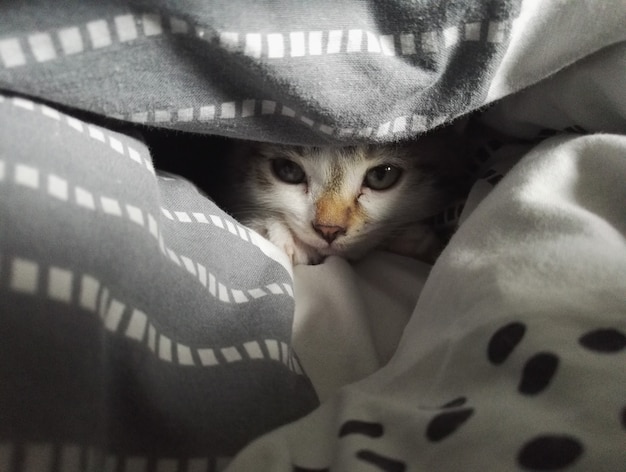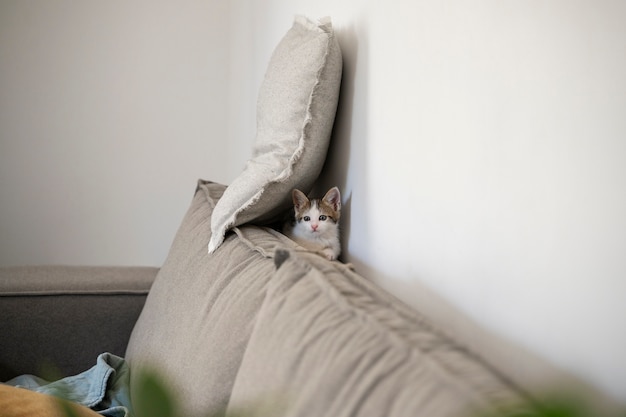Is My Cat Hiding Illness? Early Signs to Watch For


Is My Cat Hiding Illness? Early Signs to Watch For
Cats are known for their mysterious, independent personalities, but sometimes this means they hide discomfort or illness from their families until a problem becomes serious. As a devoted cat owner, you want the best for your feline companion, but it can be tricky to tell when something is wrong. At Gully Animal Hospital of Grand Prairie, our veterinary professionals understand just how subtle early signs of sick cat can be. Being able to spot changes quickly can make a big difference for your cat’s long-term health, helping to ensure prompt care and better outcomes. In this blog, we’ll explain the most common cat illness symptoms, discuss why cats tend to conceal health issues, outline what you can do at home, and guide you on when it’s time to schedule a veterinary visit.
As a full-service veterinary hospital right here in Grand Prairie, TX, we’re committed to supporting cat owners with comprehensive care, preventive medicine, and educational resources. If you suspect your cat isn’t feeling their best, our team is here to help with quality veterinary services near me designed for early detection and intervention.
Recognizing the Early Signs of Sick Cat
Cats are experts at keeping secrets when it comes to their health. Unlike dogs, who may show clear signs of pain or illness, cats often display only subtle changes. Knowing what to watch for can help you catch problems early before they become more challenging to treat.
Subtle Changes That Signal Illness
Key cat illness symptoms include a decrease in appetite, changes in drinking habits, or unexplained weight loss. You might notice your cat hiding more than usual or seeming less interested in play and interaction. Sometimes, the earliest signs involve small changes in daily routine; maybe your cat is sleeping in new places, grooming less frequently, or suddenly avoiding favorite spots. Other early signs of sick cat involve litter box habits, such as urinating outside the box, changes in stool consistency, or straining.
Additionally, some cats will vocalize more, become irritable, or appear restless. Physical symptoms might include sneezing, coughing, nasal discharge, vomiting, diarrhea, or difficulty jumping onto furniture. Even subtle changes in gait, posture, or the way your cat holds their tail can be clues.
Why Early Detection Matters
Cats who receive prompt care for emerging health issues often have a much better prognosis. Early intervention can prevent a minor problem from becoming a major one, and it may also reduce the need for more invasive treatments. By keeping a close eye on your cat’s daily patterns and reporting any changes to your veterinary team, you give your pet the best chance at a long, healthy life.
For more information about what to expect during a wellness examination and how early detection benefits your cat, visit our wellness exam page.
Understanding Why Cats Hide Illness
It can be frustrating when a beloved pet seems to conceal how they’re feeling, but this behavior has deep roots in feline biology. Understanding why cats hide pain and sickness can help you become more attuned to the subtle warning signs.
Instincts and Survival
Cats are both predators and prey animals in the wild, which means they have evolved to avoid showing vulnerability. Hiding illness or weakness helps protect them from potential threats. Even in the comfort of your home, this instinct remains strong; your cat may naturally conceal pain, hoping to avoid attention from other animals or people.
The Role of Routine
Cats thrive on routine and familiarity. When they feel unwell, they may become withdrawn or seek out quiet hiding spots to rest. They might groom excessively to comfort themselves or, conversely, neglect grooming entirely due to discomfort. Because these shifts can be subtle, it’s important to know your cat’s typical habits and personality. Small deviations can be significant when it comes to early signs of sick cat.
How Our Veterinarians Diagnose Cat Illness Symptoms in Grand Prairie
When you notice any unusual behavior or physical symptoms in your cat, the next step is to schedule an appointment with your local veterinary team. At Gully Animal Hospital of Grand Prairie, our veterinarians use a combination of thorough physical examinations and advanced diagnostic tools to uncover underlying issues.
Comprehensive Cat Exams
A typical visit starts with a detailed discussion about your cat’s recent behavior, eating and drinking patterns, litter box habits, and any concerns you’ve observed. Our veterinarians perform a nose-to-tail exam, checking vital signs, listening to the heart and lungs, palpating the abdomen, and examining the eyes, ears, teeth, and coat for abnormalities.
Diagnostic Testing
If your cat’s symptoms are subtle or difficult to pinpoint, our team may recommend additional diagnostics. This might include bloodwork to screen for infections or organ dysfunction, urine analysis to assess kidney health, or imaging such as X-rays or ultrasounds when needed. These tools help us detect issues early, even before more obvious symptoms develop.
For more information about our pet diagnostic laboratory services in Grand Prairie, including how diagnostics can catch illness in its early stages, explore our dedicated diagnostic laboratory page.
Treatment Approaches for Sick Cats
Once we’ve identified the cause of your cat’s symptoms, our veterinary professionals will discuss a tailored treatment plan. Treatment options involve medications for infections or pain, dietary changes, fluid therapy for dehydration, or surgical procedures if necessary. The specific approach depends on the diagnosis, your cat’s age and overall health, and the urgency of the condition.
We prioritize clear communication and will guide you through the treatment process, what to expect during recovery, and how to monitor your cat at home.
Preventing Illness and Supporting Your Cat at Home
While some health issues are unavoidable, there are many steps you can take to help your cat stay healthy and catch problems early. Preventive care is a cornerstone of our philosophy at Gully Animal Hospital of Grand Prairie.
The Importance of Preventive Veterinary Care
Regular wellness exams play a crucial role in early detection. By scheduling annual or semi-annual checkups, you give our veterinary team the chance to spot subtle changes that may not be obvious at home. Vaccination services in Grand Prairie protect cats from contagious diseases, while routine dental care and parasite prevention help maintain overall health.
At home, monitoring your cat’s eating, drinking, litter box habits, and activity levels will keep you attuned to any changes. We encourage you to keep a journal of any new behaviors or symptoms, as this information is invaluable during veterinary visits.
If you’re interested in learning more about preventive care, vaccinations, or how to keep your cat healthy throughout each life stage, visit our pet immunizations page.
Creating a Healthy Environment
Providing a stable, low-stress household with opportunities for play, climbing, and mental stimulation supports your cat’s wellbeing. Ensure access to fresh water, high-quality food, and a clean litter box. Regular grooming will help you spot skin issues, lumps, or signs of discomfort early.
When Should You Schedule a Veterinary Visit?
Knowing when to seek professional help can be challenging, especially with cats who try to hide their symptoms. Our general guideline is to trust your instincts; if you notice any changes in your cat’s normal routine, appetite, litter box use, or demeanor that last longer than a day or two, it’s time to call your veterinarian.
Urgent Signs That Require Immediate Attention
Certain cat illness symptoms require prompt veterinary care. These include difficulty breathing, persistent vomiting or diarrhea, lethargy, sudden collapse, severe pain, inability to urinate, or signs of poisoning such as drooling, seizures, or unresponsiveness. If you observe any of these warning signs, do not wait; contact a veterinary clinic right away.
For after-hours emergencies or situations that can’t wait until regular business hours, please review our after hours pet emergency information for guidance on what to do next.
The Value of Local Veterinary Services
Choosing quality veterinary services in Grand Prairie ensures your cat receives timely, compassionate care from a team who understands the unique needs of local pets. Whether you’re searching for a vet near me or need specialized advice on cat illness symptoms, our team is here to support you and your pet every step of the way.
Compassionate Care for Sick Cats in Grand Prairie and Surrounding Communities
Detecting illness early in cats can be challenging, but with careful attention and regular veterinary care, you can help your feline companion enjoy a long, healthy life. At Gully Animal Hospital of Grand Prairie, our veterinarians are dedicated to providing comprehensive wellness exams, advanced diagnostics, and ongoing support for cat owners throughout Grand Prairie and the surrounding communities.
If you’ve noticed any early signs of sick cat or just want the peace of mind that comes with a thorough evaluation, we encourage you to schedule an appointment with our veterinary team. We’re committed to offering the trusted experience and quality veterinary diagnostics in Grand Prairie that local cat owners rely on.
To book a visit or ask questions about your cat’s health, call us at (214) 412-2462 or visit our conveniently located clinic at 2942 West Camp Wisdom Rd, Grand Prairie, TX 75052. For those searching for a vet near me who truly cares, Gully Animal Hospital of Grand Prairie is here to help you and your pet thrive—every day.
Disclaimer: This blog is intended for informational purposes only and should not be used as a substitute for professional veterinary advice. If you are concerned about your cat’s health, please contact your veterinarian promptly for guidance and care.



















